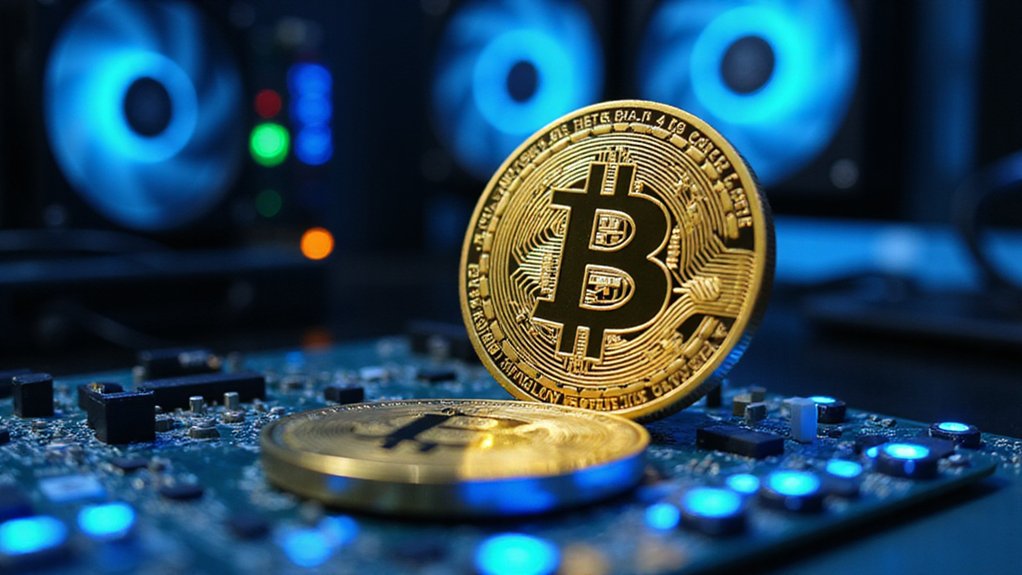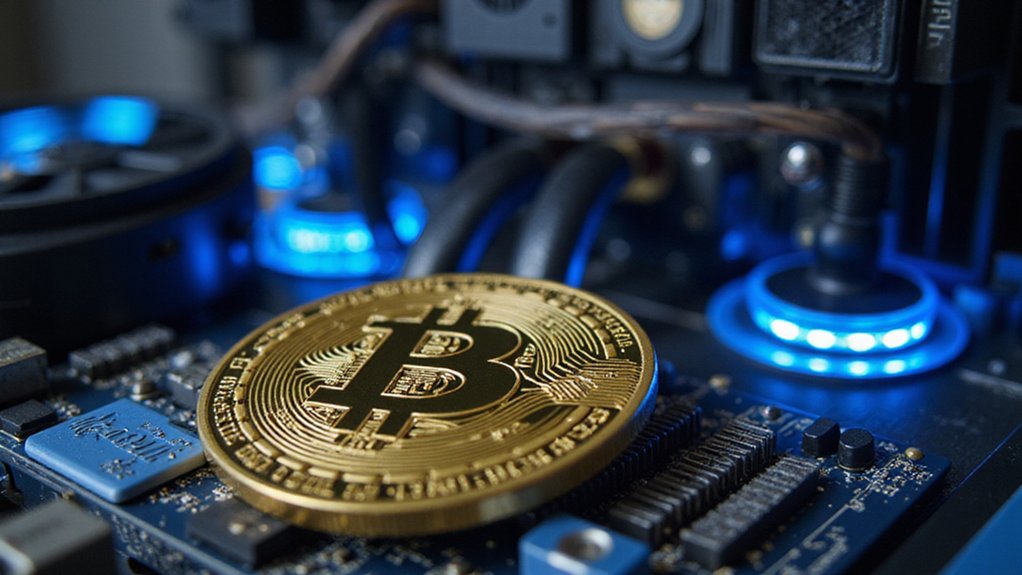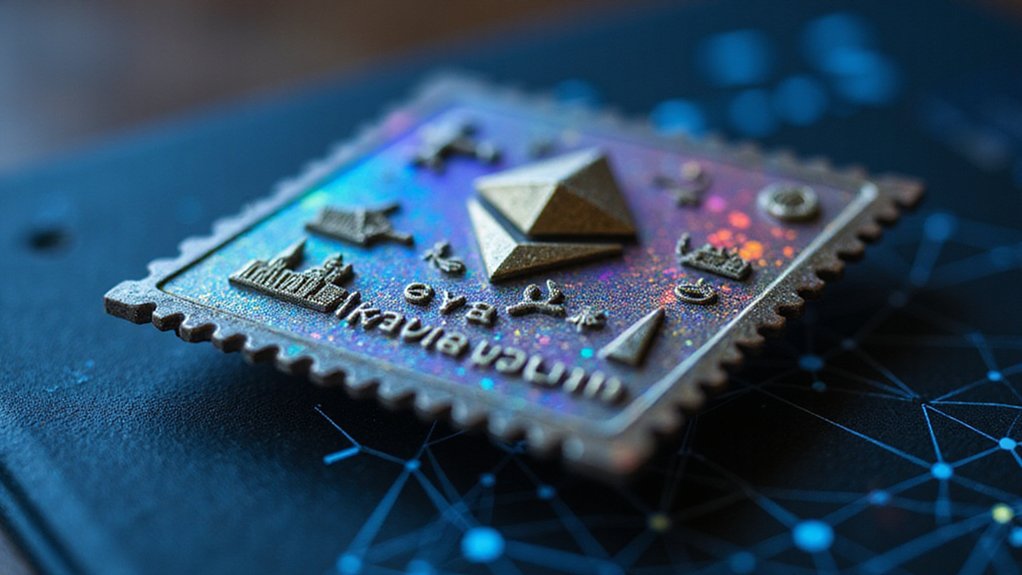Beginners seeking Bitcoin can pursue multiple acquisition paths beyond traditional purchases. Faucet websites offer minimal rewards for simple tasks, while freelancing platforms enable cryptocurrency compensation for skills. Mining—once accessible to hobbyists—now requires substantial investment in specialized hardware. Day trading presents high-risk opportunities for the market-savvy, while dollar-cost averaging appeals to the volatility-averse. For the prudent beginner, completing online tasks or providing services represents the lowest-barrier entry point to Bitcoin’s digital economy. The subsequent strategies expand these foundations with practical implementation details.

Why scramble for pennies when digital gold awaits the informed seeker? Bitcoin, the preeminent cryptocurrency that has transformed financial paradigms, presents multiple acquisition pathways for the uninitiated—ranging from computational participation to task-based remuneration.
The mining process, which undergirds the entire Bitcoin ecosystem, involves validating transactions through the resolution of complex mathematical puzzles, rewarding successful miners with newly minted coins.
Mining: Bitcoin’s algorithmic heartbeat, where mathematical prowess transmutes computational effort into digital wealth.
While potentially lucrative, this approach necessitates specialized ASIC hardware and confronts the sobering reality of substantial electricity consumption (a fact that environmentalists might regard with thinly veiled horror).
For those deterred by mining’s capital requirements, Bitcoin faucets offer modest cryptocurrency disbursements in exchange for completing rudimentary tasks—a proposition that, while hardly wealth-generating, provides risk-free exposure to the Bitcoin ecosystem.
Freelancing platforms simultaneously present opportunities for service providers to receive payment in Bitcoin, effectively transmuting intellectual capital into cryptocurrency holdings without the intermediation of traditional banking systems.
The exchange-based acquisition of Bitcoin—whether through spot purchases or more sophisticated trading strategies—remains the most direct approach for neophytes.
The much-vaunted “HODL” strategy (a fortuitous misspelling that became investment doctrine) contrasts with active trading, which requires market acumen but potentially accelerates accumulation¹.
Automated recurring purchases mitigate timing risk through dollar-cost averaging, a prudent approach amid Bitcoin’s notorious volatility.
The risk-tolerant might explore Bitcoin-based gambling platforms, which offer traditional casino games with cryptocurrency payouts. Remember that with the 21 million cap on total Bitcoin supply, each fraction you acquire represents an increasingly scarce digital asset.
Such ventures, while occasionally profitable, carry self-evident financial hazards that require no elaboration for the financially literate.
Affiliate marketing and referral programs present a lower-risk alternative, allowing participants to monetize their social capital through commission-based promotion of Bitcoin-related products and services.
Mining operations have become increasingly centralized, with facilities like those in Dalton, Georgia consuming power equivalent to 97,000 households while competing for limited block rewards.
Some miners opt for pool mining strategies to combine computational resources with others, increasing their chances of earning rewards despite the growing competition.
In the final analysis, successful Bitcoin acquisition demands a strategy aligned with one’s risk tolerance, technical capabilities, and available resources—a personalized approach to participating in what may be the most significant monetary experiment of our time.
¹The irony that the most profitable Bitcoin strategy has often been simple inaction is not lost on market veterans.
Frequently Asked Questions
Is Winning Bitcoins Legal in All Countries?
No, winning bitcoins through gambling isn’t universally legal.
The regulatory landscape presents a veritable patchwork of approaches—from Malta’s embracive Blockchain Sandbox Framework to China’s outright prohibition.
Muslim-majority nations typically forbid gambling activities entirely, while the U.S. exhibits state-by-state variability.
Many jurisdictions occupy a regulatory gray area, with legislation struggling to keep pace with cryptocurrency innovations.
The legality ultimately hinges upon one’s geographical location and the corresponding jurisdiction’s stance on both gambling and digital assets.
What Are the Tax Implications of Winning Bitcoins?
When individuals “win” bitcoins, the IRS views this as taxable income—akin to prize winnings.
Recipients must report the fair market value of these digital windfalls as ordinary income on the date of receipt.
The crypto then establishes a cost basis for future capital gains calculations.
Should winners subsequently sell, trade, or spend these bitcoins, they’ll trigger a second taxable event, potentially generating capital gains (or losses) based on the holding period¹.
¹The byzantine nature of cryptocurrency taxation makes one almost nostalgic for the comparative simplicity of W-2 forms.
How Secure Are Bitcoin Gambling Platforms?
Bitcoin gambling platforms vary dramatically in security posture.
Reputable sites implement robust protections—SSL encryption, cold storage, 2FA, and regular audits—while dubious operators skimp on these essentials (often with predictably catastrophic results).
Users should evaluate platforms based on licensing credentials, provably fair algorithms, and established reputations.
Despite the industry’s technological sophistication, the old adage applies: platforms lacking transparent security protocols constitute the digital equivalent of leaving valuables in an unsecured car.
Can I Win Bitcoins Without Investing Money First?
Yes, individuals can acquire bitcoins without initial investment through several avenues.
Faucet sites dispense minute amounts for completing simple tasks, while microtask platforms compensate users with satoshis for surveys and social media engagements.
Gaming rewards and referral programs (often surprisingly lucrative in aggregate) provide additional opportunities.
Bitcoin airdrops—those periodic corporate largesse events—occasionally yield free tokens.
Interest-bearing accounts, while technically requiring bitcoin holdings, represent another pathway for passive accumulation without traditional “investment” in the conventional sense.
What Happens if I Forget My Bitcoin Wallet Password?
¹Recovery services exist but success rates remain dismal given Bitcoin’s deliberately robust security architecture.









